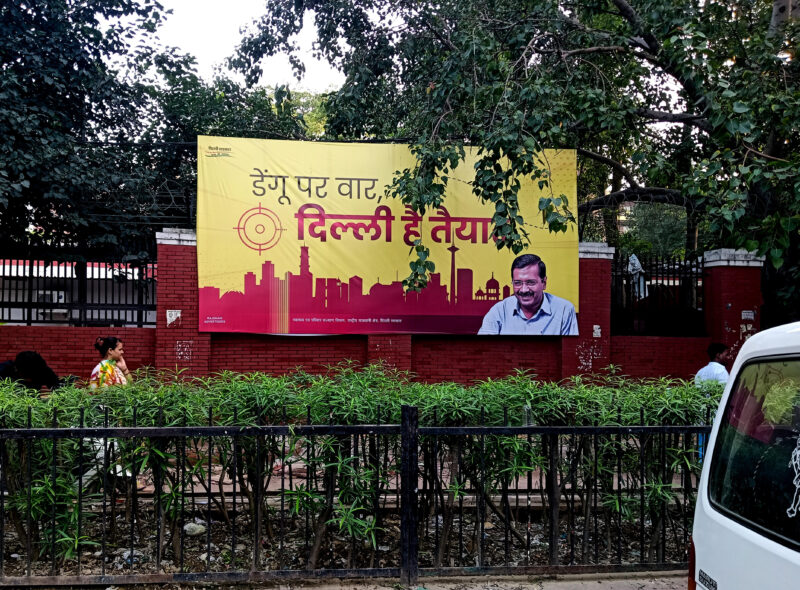With three days of incessant heavy showers in Delhi, the national capital has taken a jump from rain deficit to surplus in September and the sultry weather turned pleasant.
However, even though a shift in the weather gave a sigh of relief to residents, it spiked the chances of the spread of water-borne diseases in the city.
Within a week, the number of dengue cases shot up by 25%. According to sources, until 17 September, Delhi registered a total of 152 dengue cases, just in the first half of the month.
A senior official in the Government’s Health Department says that this has been the highest since 2017.
Deadly disease
“During the month of August, the total number of registered cases of dengue in Delhi was somewhere around 75, there were 32 in June and 135 such cases from January to 25 June. On the contrary, somewhere around 430 dengue cases have been registered till date – highest since the same period of January to September in 2017, when the figure reached a high of 1,400,” he says.
Also read: Helpline and complaint numbers: MCD takes another step against Dengue in Delhi
But, as per the data provided by the MCD, just the year 2021 registered a massive total of around 9,600 cases in the National Capital territory.
The other data on display is significantly different and much higher than the one provided earlier. “In 2016, there were 4,431 cases reported. In 2017, there were 4,726 cases reported. In 2018, there were 2,798 cases reported. In 2019, there were 2,036 cases reported,” the MCD official says.
“As 1,072 illnesses were reported in 2020, the lowest number between 2016 and 2021, the infections decreased by almost 50%,” he adds.
This year has seen a swift increase in the number of dengue cases registered in Delhi.
The Delhi government, after the continuous rain and the increased threat of a huge rise in the cases of dengue, has prepared an action plan keeping in mind the present health situation.

HOLLOW ASSURANCE: A hoarding shows the CM is aware of the problem, but no sign of clean-ups
A senior official working in the Delhi Government’s department of health has told Patriot about the new measures. “The plan has been created in collaboration with the health division of the Delhi government, Delhi Municipal Corporation, the New Delhi Municipal Council, and other related departments. In the next few days, a number of actions are yet to be taken by the government in order to put a full stop to the increasing cases of dengue,” he states.
“To halt the spread of dengue, school children, in particular, will be heavily involved. Awareness drives and sensitization regarding the spread of dengue and such diseases would be done among the students as well,” he adds.
On 24 September, the Kejriwal government announced that initiatives will be adopted for a large-scale awareness drive involving the Resident Welfare Associations, market associations, societies and communities to get a grip over the increasing cases.
Doctors sceptical
A doctor involved in treating patients infected with dengue and other similar vector-borne diseases seemed unconvinced by the government’s stand.
“For instance, look at the situation in Safdarjung Hospital, where most of such patients are treated. Beds are unavailable, there are issues with the availability of medicines as well. Patients are lying in the corridor and the waiting area unattended,” the doctor, who spoke on condition of anonymity, says.
“There are a lot of things that are yet to be considered by the government, rather than just speaking in front of the media,” she adds.
Throwing light on government hospitals, she says, “Public hospitals are where most of those from the working class population is coming. It is impossible for them to afford the big private hospitals and thus, the few government hospitals are their only hope. The construction of new government hospitals is the only hope in the midst of despair,” she says.
Another doctor, working at Safdarjung Hospital, says that it isn’t just about the rising cases of dengue. “Around 92 cases of malaria have been registered in Delhi along with 18-20 cases of chikungunya as well. Cases of monkeypox have also reached a total of nine in Delhi out of the 11 such cases in India,” he states.
“Plus, we are not completely out of the Covid situation. The cases are still coming and there are casualties as well. We need to be much more prepared for the upcoming situation, but I feel that we are not bothered enough for that,” he concludes.
Measures taken
A senior official representing the Delhi government has stated that the Kejriwal government is taking all the required measures to keep the cases of dengue in control.
“Children are being encouraged to check for stagnant water outside their homes and to alert their families to clean such areas,” he says. He added that the officials have been instructed to regularly examine these areas near their workplaces as well.
“The district magistrate, sub-divisional magistrate, and tehsildars will be in charge of conducting inspections throughout their jurisdictions. Every Saturday, officials will visit building sites to inspect for waterlogging as well,” he states.
The MCD official spoke about the actions and fines that they have levied upon the cases of stagnant water in Delhi’s different locations. According to a senior official, “Almost 78,000 notices have been issued by the MCD and an approximate fine amount of Rs 24 lakh have been collected through the penalties and challans served to households as a part of the anti-mosquito breeding drive of the MCD”.
For more stories that cover the ongoings of Delhi NCR, follow us on:
Instagram: instagram.com/thepatriot_in/
Twitter: twitter.com/Patriot_Delhi
Facebook: facebook.com/Thepatriotnewsindia





